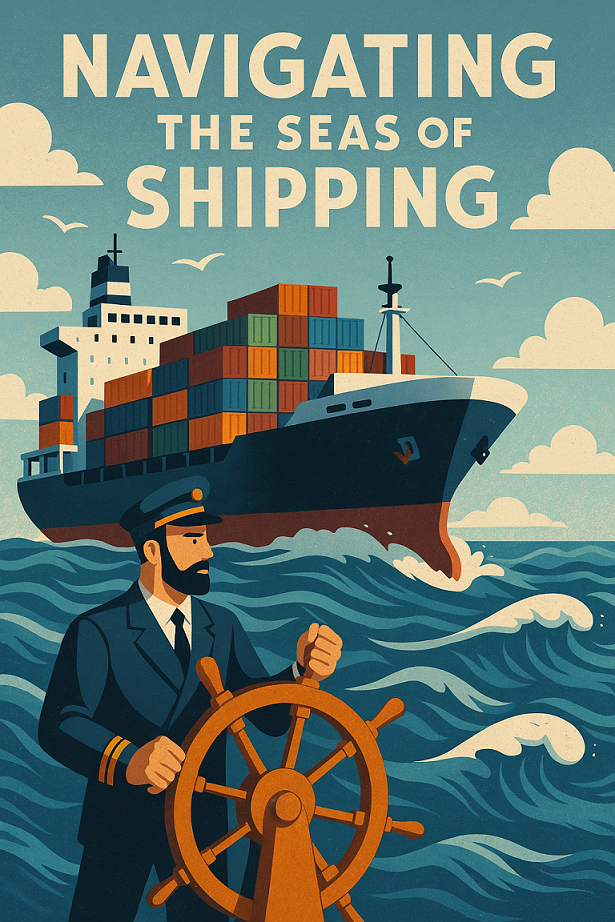Explore essential shipping-related terms and concepts, from freight logistics to international shipping services, tailored for maritime students, cadets, ship officers, and industry professionals.
Why Understanding Shipping Terminology is Vital
In the vast and intricate world of maritime operations, a clear grasp of shipping-related terminology is crucial. Whether you’re a maritime student, cadet, ship officer, or industry professional, familiarity with these terms enhances communication, ensures compliance, and streamlines operations. This article delves into key shipping concepts, providing insights and real-world applications to bolster your maritime expertise.
Key Shipping-Related Terms and Concepts
1. Shipping Companies
Shipping companies are entities that own and operate vessels to transport goods and passengers across waterways. They play a pivotal role in global trade, ensuring the movement of commodities between nations. Understanding the operations and services of these companies is foundational for maritime professionals.
2. Car Shipping
Car shipping refers to the transportation of automobiles via sea, land, or air. This service is essential for manufacturers, dealerships, and individuals relocating vehicles internationally. Professionals must be versed in the logistics, regulations, and best practices associated with car shipping to ensure vehicle safety and compliance.
3. Auto Transport
Closely related to car shipping, auto transport encompasses the broader industry dedicated to moving vehicles. This includes understanding various transport methods, such as open and enclosed carriers, and the factors influencing transport costs and timelines.
4. Freight Shipping Services
Freight shipping services involve the transportation of goods, cargo, and commodities via ships, trucks, trains, or airplanes. Professionals should be familiar with different freight classes, shipping rates, and the documentation required for domestic and international shipments.
5. International Shipping Services
International shipping services facilitate the movement of goods across international borders. This requires knowledge of customs regulations, import/export restrictions, and international trade agreements. Maritime professionals must ensure compliance with global standards to prevent legal complications.
6. Sea Freight Shipping
Sea freight shipping pertains to transporting goods via ocean vessels. It’s a cost-effective method for bulk shipments. Understanding the nuances of sea freight, including containerization, port operations, and transit times, is vital for efficient maritime logistics.
7. Freight Forwarding Companies
Freight forwarding companies act as intermediaries between shippers and carriers, coordinating the logistics of transporting goods. They handle tasks like booking cargo space, preparing documentation, and arranging storage. Collaborating effectively with freight forwarders can streamline shipping processes and mitigate potential issues.
8. Logistics Shipping Company
A logistics shipping company offers comprehensive services that encompass transportation, warehousing, and distribution. They manage the entire supply chain, ensuring that goods move efficiently from origin to destination. Understanding their role helps in optimizing logistics strategies and improving operational efficiency.
9. Shipping Logistics
Shipping logistics involves planning, implementing, and controlling the efficient movement and storage of goods. It encompasses route optimization, inventory management, and coordination among various stakeholders. Proficiency in shipping logistics is essential for minimizing costs and enhancing service delivery.
10. Freight Logistics
Freight logistics focuses on the management of freight transportation, including carrier selection, freight consolidation, and tracking. Effective freight logistics ensure timely deliveries and cost savings, making it a critical area of expertise for maritime professionals.
Applications & Examples in the Maritime Industry
-
Optimizing Supply Chains: Shipping companies utilize logistics services to streamline supply chains, reducing transit times and costs.
-
Vehicle Relocation: Auto transport services enable manufacturers to distribute vehicles globally, meeting market demands efficiently.
-
Global Trade Facilitation: Freight forwarding companies coordinate international shipments, ensuring compliance with diverse regulations and facilitating smooth trade operations.
Latest Trends & Future Outlook
-
Digitalization: The integration of digital technologies in shipping logistics is enhancing transparency, tracking, and efficiency.
-
Sustainability: There’s a growing emphasis on eco-friendly shipping practices, including the use of cleaner fuels and optimized routes to reduce carbon footprints.
-
Automation: The adoption of autonomous ships and automated port operations is set to revolutionize the maritime industry, improving safety and reducing human error.
Conclusion: Mastering Maritime Terminology for Professional Excellence
A thorough understanding of shipping-related terms and concepts is indispensable for maritime professionals. It not only facilitates effective communication but also enhances operational efficiency and compliance. Staying abreast of industry trends and continuously expanding your knowledge base will position you for success in the dynamic world of maritime operations.

